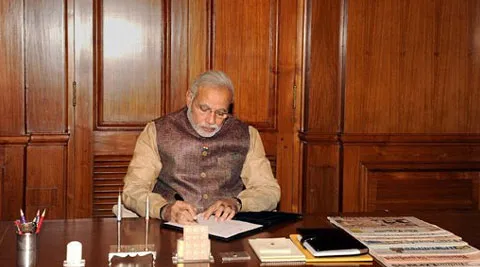As Prime Minister Narendra Modi completes one month in office on Thursday, there are clear signals of a marked shift from the previous UPA regime in terms of style of governance. Except the case of rail fare hike, which was partially rolled back on suburban journey due to pressures from poll-bound Maharashtra, the NDA government has been firm and decisive.
Modi started his stint in Delhi with a firm message to his BJP colleagues leaving children of party veterans and even heavyweights aged over 75 years out of his Council of Ministers. He will soon be accommodating the sepruagenarians in Raj Bhawans though. If some ministers like Jitendra Singh or V K Singh diverted focus from the main agenda of governance with their controversial remarks about Article 370 and the next Army Chief respectively, they were immediately reined in. If there was a legal hurdle in the appointment of Nripendra Mishra as his Principal Secretary, it was removed through an ordinance. The PM reconstituted the Appointment Committee of the Cabinet to include only himself and the Home Minister leaving the “concerned ministers” out. These measures have underlined the sharp contrast between Modi and his predecessor Manmohan Singh who had been found wanting in decisiveness due to dual power centres or otherwise.
If people expected Modi to get overwhelmed by the popular mandate and shower bonanzas on them in the forthcoming Budget, the new PM has chosen to prescribe “bitter medicine” to rescue the economy. The LPG and kerosene subsidies are said to be next on the agenda. Concerns about the fiscal health due to such subsidies had been repeatedly discussed in the previous UPA dispensation, but there were only half-hearted attempts to address them.
Unlike the UPA regime in which some influential ministers loyal to 10, Janpath often managed to torpedo the PM’s agenda, Modi’s ministers seem to have decided to put their heads down for now to carry out his instructions.
The PM also reached out to Secretaries to the government of India seeking their views and feedback and asking them to reach him on his personal email whenever needed. While many in the bureaucracy are not convinced by the PM’s instructions to his ministers not to have private secretaries who had served ministers of the UPA regime— the move, they say, have painted all private secretaries in the current regime as saffronites — nobody is protesting.
On the administrative front, Modi shelved the Empowered Groups of Ministers (EGoMs) and GoMs to remove bottleneks in the decision-making

 Narendra Modi took oath as 15th Prime Minister of India on May 26.
Narendra Modi took oath as 15th Prime Minister of India on May 26.
No comments:
Post a Comment